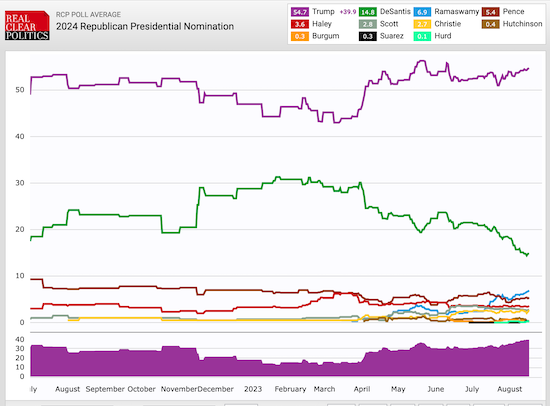The Republican frontrunner promised us a decision this week on whether he’ll show up to debate next Wednesday. He hasn’t announced it as I write this, but theories about what he might do are kicking around online.
I have a favorite among them.
One is that he’ll skip the event and counterprogram it by returning to The Site Formerly Known As Twitter after two years away for an interview with Tucker Carlson. Trump himself has raised this possibility with advisers, according to CNN. If it comes off, and if Carlson is willing to bite the hand that now feeds him, recent revelations in the news could make it enjoyably awkward for Twitter’s owner.
Another theory is that he’ll confound expectations and surprise everyone by turning up in Milwaukee after all. I like this scenario, and not just because it would give Chris Christie a chance to bloody his nose. Trump has refused to sign the idiotic loyalty pledge needed to qualify for the debate; if he shows up and demands a place on stage anyway, watching the preposterous cowards at the RNC capitulate and accommodate him by waiving the requirement would be gratifying.
Trump’s only virtue is his ability to force ethical dilemmas on people that reveal who they truly are. It’d be fun to watch him do it to the RNC in real time, tearing off another chunk of their credibility and reminding the country that what purports to be a respectable political party is a monarchy whose ruler is, as always, unaccountable to institutions to whom everyone else must account.
But that’s not my favorite scenario.
My favorite, raised by Jonathan Last and others, is that Trump will choose next Wednesday to surrender to authorities in Georgia. On Tuesday he was given 10 days to do so; August 23, the day of the debate, will be the eighth day in that window. By showing up in Fulton County on the 23rd, he’d “take over the entire news cycle that day with its wall-to-wall coverage of the fingerprinting and mugshot,” Last writes. Then, that evening, he’d presumably hold a rally that would just so happen to air opposite the Republican debate.
That would be true to the nature of the man, converting a personal failure that would shame any normal human into a publicity opportunity. But it’d also be true to the nature of the party in 2023. Trump would be calculating—almost certainly correctly—that he’ll gain more traction with Republican voters by gloating about his legal jeopardy than a bunch of (mostly) serious challengers will from debating how the country should be governed.
Crime does pay politically, it seems.
After the GOP’s midterm disaster, the electability argument against Trump looked poised for success in the primary. The looming criminal cases against him would be the last straw for most Republican voters, we all hoped, especially with an alternative available in Ron DeSantis who was fresh off a landslide victory in a primary state.
As the first debate approaches, with the GOP hugging Trump tighter while everyone else recoils, is there anything left of that argument?
Last week I wrote about an unnamed Dispatch colleague who believes DeSantis’ strategy has been wrong from the start. That colleague revealed himself on last week’s Dispatch Podcast, which I encourage you to listen to if you want to know who he is.
The only hint I’ll give you is that his name rhymes with “Steve Hayes.”
What DeSantis should have done, my mystery colleague insists, is shelve the 24/7 anti-woke babbling and draw a contrast with Trump on competence and electability instead. The governor has used state power to advance the right’s cultural agenda in Florida far more aggressively than Trump did as president. He’s the more competent executive. (Smarter, too. By a lot.) He should talk about it. He also took a state Trump won by 3 points in 2020 and turned it into a 19-point Republican juggernaut two years later, no easy feat in a bitterly polarized country. Who’s more electable, a guy who painted Florida blood red or a guy who’s never matched Mitt Romney’s share of the popular vote in 2012 despite having had two cracks at doing so?
Ron DeSantis should be talking about electability—often, and passionately. Had he done so from the start, my colleague speculates, he wouldn’t be in the fix he’s in.
That’s a reasonable argument. In a normal party, competence and electability would be just what persuadable voters are looking for.
I stress: in a normal party.
In the actual party to which Ron DeSantis belongs, getting voters to care about competence is a heavy-bordering-on-impossible lift. This detail from a recent New Yorker piece about the governor’s struggling campaign is circulating today on social media:
Even before its official launch, the [DeSantis] campaign and its allies were conducting polls and focus groups to test various anti-Trump messages. Across several months, the source familiar with the campaign said that it consistently struggled to find a message critical of Trump that resonated with rank-and-file Republican voters. Even attaching Trump’s name to an otherwise effective message had a tendency to invert the results, this source said. If a moderator said that the COVID lockdowns destroyed small businesses and facilitated the largest upward wealth transfer in modern American history, seventy per cent of the Republicans surveyed would agree. But, if the moderator said that Trump’s COVID lockdowns destroyed small businesses and facilitated the largest upward wealth transfer in modern American history, the source said, seventy per cent would disagree.
Sources inside DeSantis’ campaign are telling reporters that it isn’t true, but aren’t they obliged to say that? After all, if attaching Trump’s name to a disfavored policy is enough to flip Republicans from opposing it to supporting it, the logic of DeSantis’ candidacy is up in smoke. He’s aiming to convince primary voters that on populist priorities like lockdowns, the border wall, and yes, anti-wokeness, Trump has been an incompetent champion for the right. If right-wing voters view Trump’s policies as competent per se, there’s no way to make that argument effectively.
“Trump but competent,” the brand DeSantis supposedly should have been crafting for himself from day one, might turn out to be a does-not-compute redundancy for most Republicans.
The news about electability is grimmer.
Several polls published this week have measured public reaction to the Georgia indictment. They confirm what you’d suspect, that Americans are very reluctant to hand the presidency to someone in dire criminal jeopardy. Consistently, more people say they believe Trump did something illegal and/or should be charged than say he shouldn’t: 53 percent in Fox News’ survey, 54 percent in Quinnipiac’s, 49 percent in ABC’s.
Large majorities told Quinnipiac and ABC that they view the Georgia charges as serious. Half told ABC they think Trump should suspend his campaign versus 33 percent who said otherwise. A fourth poll published by Semafor asked voters whether this week’s indictment makes them more or less likely to vote for Trump next year. Fully 61 percent of independents and even 24 percent of Republicans said less, or at least somewhat.
And as noted yesterday, an Associated Press survey finds 53 percent say they “definitely” won’t vote for him next fall. Political parties normally don’t nominate candidates whom they have reason to believe a majority of the country already strongly opposes, do they?
Normally, I stress.
The wrinkle in all of this polling is that, just as Trump looks less likely than ever to win a general election, he looks more likely than ever to lock up the GOP nomination without a fight. Here’s today’s RealClearPolitics national average:

At 39.9 points, he now has his biggest lead of the primary. He’s polling higher at the moment than he has in two months, since shortly after he was indicted for concealing classified documents. DeSantis has dropped below 15 percent and reached an all-time low just two days ago. Only once in the last dozen national polls has he managed to score as high as 18 percent; in one survey he bottomed out at 10, behind Vivek Ramaswamy.
Two recent polls, one by Quinnipiac and the other by YouGov, have him polling at his lowest level of the campaign. The man who turned Florida redder than Texas is getting obliterated by a guy who stands accused of 91 crimes and counting.
This is, dare I say, not what we’d expect from a primary electorate that cares about electability. And if they don’t care about it, the promising “competence and electability” strategy that Ron DeSantis neglected to pursue doesn’t seem like it would have been so promising after all.
Do Republican voters care?
A despairing Charles Cooke put that question to his readers at National Review today.
I have no doubt that there are lots of Republican primary voters who do not know many people who hate Donald Trump. Perhaps you are one of them. But the thing is: Those people that you don’t know still get to vote. There are a lot more of them than there are of you. And like it or not, they are sending about as strong a message as it is possible to send that they do not want Donald Trump to be the Republican nominee in 2024. Unlike the party’s primary voters, they do not believe that the many charges against Trump are frivolous. The bringing of those charges has not caused them to like him more than they did before. The public’s impression of him has worsened, rather than improved, over time. Again, this may not be your personal experience, but the data are clear: The gap between the Republican primary electorate and the voting public is now comparable to the gap between progressives in elite institutions and the voting public. Remember that New Yorker cover showing the cramped and myopic view of America that is exhibited by the residents of New York City? At present, one could mock up a similar drawing depicting the GOP base.
With due respect to Charlie, he’s done a disservice to New Yorkers there. The distortions created by the modern Republican information bubble are more severe, I suspect, than those caused by the cultural myopia of the over-educated Manhattan liberal.
And because they are, his point about GOP voters being literally unable to fathom Trump’s unpopularity is a sound one. The purpose of right-wing media is to guard whatever information can be safely kept from the audience and to discredit whatever information that can’t. That means statistical evidence of Trump’s electability problem either won’t reach most Republicans with its credibility intact or it won’t reach them at all. And if it does, it’ll run up against years of conditioning encouraging them to believe that “any negative polls are fake news” and that even election results can’t be trusted when they’re adverse.
It may be, in other words, that right-wing voters have been so warped by propaganda that they’re no longer capable of comprehending that most of the country doesn’t esteem Trump the way they do. If that’s true, DeSantis will never sell them on an electability argument. Of course Trump can win—The People worship the ground he walks on, don’t they?
Another theory, which I tend to favor, is that Republicans understand perfectly well that Trump is unpopular with the wider electorate. They just don’t care.
Contra Cooke, who’s baffled that a political party would choose to play its weakest hand in an election, the GOP isn’t chiefly a party anymore. It’s a cultural identity. It relishes its perceived victimization and the grievances arising from it more than it hopes to wield power. If primary voters are choosing a candidate based on who best represents their cultural antagonism toward the left rather than who’s most likely to win, it’s hard to beat the guy who’s been indicted on 91 counts by three different Democratic-run law enforcement agencies.
“In my view the plan is to exist as an opposition entity, where the impurity of actually legislating is removed,” said the New York Times’ Jane Coaston, addressing the burning question of what on earth Republican voters are thinking. That’s about right, I think: If what they really want is to nurture their resentments of the other party, remaining the minority opposition in perpetuity is helpful. They may not want to lose, exactly, but they’re very much willing to lose. And an electorate that’s willing to lose is an electorate that won’t respond well to electability arguments.
Whichever theory you prefer, though, I have bad news. If, like my Dispatch mystery colleague, you’re hoping and expecting to see Ron DeSantis at last lean hard into electability at next week’s debate, you should adjust your expectations.
On Tuesday night the governor was asked about the new indictment in Georgia. That was an opportunity to pivot and get aggressive about Trump’s collapsing chances of winning next fall. Instead DeSantis took to whining that Fulton County should focus on catching the real criminals.
Notice which Twitter account clipped and promoted that video. If I were running for president, I would not defend my opponent who’s leading by 40 points—and if for some idiotic reason I did, I wouldn’t have my own “war room” circulate the moment to undecided voters.
As pitiful as that is, the Times published an even more pitiful revelation about DeSantis’ tactics on Thursday. A debate-prep memo posted online by the governor’s super PAC recommends that, when Chris Christie criticizes Trump at the debate, DeSantis should … ride to Trump’s defense. “Trump isn’t here, so let’s just leave him alone,” the memo encourages him to say to Christie in response. “He’s too weak to defend himself here. We’re all running against him. I don’t think we want to join forces with someone on this stage who’s auditioning for a show on MSNBC.”
The thought of the governor wasting his best and likely only chance to wound Trump in a meaningful way by volunteering as a Trump surrogate against Christie has left even some at DeSantis-friendly National Review wondering what the point of this primary actually is. Has Team Ron given up on its chances for victory so totally that it’s decided to start wooing MAGA voters ahead of 2028 by shilling for Trump?
I don’t think so. I think this is just DeSantis following his overarching campaign strategy to its bitter logical conclusion.
He’s always believed that no one can win this race without cracking Trump’s populist base. His scheme to lure that base into his camp by out-populist-ing its leader has clearly failed; his only chance at the nomination now is to cross his fingers, hope that Mother Nature or Lady Justice takes care of Trump, and remain in the good graces of MAGA voters in the meantime. If the frontrunner has to drop out for whatever reason, Ron DeSantis could go from 10 percent to 40 percent overnight—if, that is, he refrains from doing anything to offend Trump’s supporters.
Like, say, by pushing too hard on the idea that the 2020 election wasn’t rigged after all.
At FiveThirtyEight today, Geoffrey Skelley flagged a CBS poll from June that found that if Trump left the race, 74 percent of Republicans would want a nominee who’s “similar” to him while a mere 26 percent would want someone who’s “different.” No wonder, wrote Skelley, that only the no-hopers like Christie, Will Hurd, and Asa Hutchinson have dared to attack Trump on his criminal troubles while more plausible nominees like DeSantis have bitten their tongues.
If the governor has any chance left of winning this primary, he needs to make sure that Republican voters continue to see him as more “similar” to Trump than “different.” If that means standing up to Christie—who’s clearly “different”—on Trump’s behalf in a matter as sensitive as his indictments then, evidently, that’s what it means. Ron DeSantis is apparently willing to sacrifice what’s left of his dignity, not to mention his manhood, by defending a vicious bully who belittles him all day and night because that’s the only way he can preserve his very remote chance of becoming president.
We’ve seen that movie before. I didn’t think we’d see it again. But the very intelligent governor of Florida and his team of strategists, having thought long and hard about the twisted psychology of Republican primary voters, seem to believe they’ll get closer to the White House by defending the human-crime-spree who keeps wedgie-ing him than they will by reminding those voters that Trump is a near-lock to lose again next fall. They’re probably right.







Please note that we at The Dispatch hold ourselves, our work, and our commenters to a higher standard than other places on the internet. We welcome comments that foster genuine debate or discussion—including comments critical of us or our work—but responses that include ad hominem attacks on fellow Dispatch members or are intended to stoke fear and anger may be moderated.
With your membership, you only have the ability to comment on The Morning Dispatch articles. Consider upgrading to join the conversation everywhere.